Coronavirus: Could pandemic spark cycling revolution in NI?
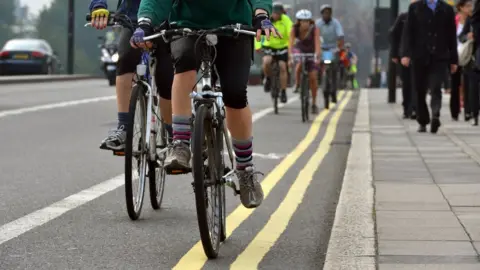 BBC
BBCThe impact of coronavirus is going to change many aspects of our everyday lives, at least in the short term.
Could the crisis be the catalyst to get lots more people on their bikes?
That is the intention of Stormont's Infrastructure Minister, Nichola Mallon.
Mrs Mallon talked about the need to extend pavements, pedestrianise streets and introduce pop-up cycle lanes.
She said she had already identified some areas in Belfast and Derry city centres that could be quickly transformed.
And on Saturday, the UK's Transport Secretary, Grant Shapps, pledged £250m for improvements to cycling and walking infrastructure, noting there had been unprecedented levels of walking and cycling during the pandemic.
He said: "Whilst it's crucial that we stay at home, when the country does get back to work we need to ask those people to carry on cycling or walking and for them to be joined by many others as well."
A Walking and Cycling Champion is also to be appointed in Ms Mallon's department to drive the delivery of policies.
The rhetoric was stirring - she spoke of the need to re-imagine places and inspire a new way of living.
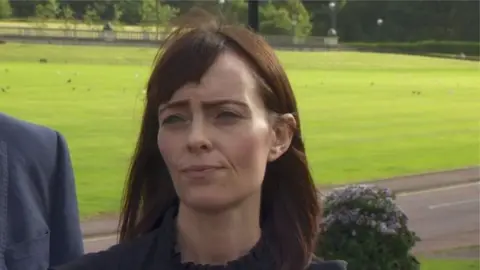
We have, to some extent, been here before.
He set up a cycling unit in the department, there was some progress on infrastructure and a real effort to get cycling on the policy agenda.
But it fell short of a revolution, with just an incremental increase in cycling.
'A narrow window of opportunity'
Mr Kennedy is supportive of Mrs Mallon's intention to seize the moment.
"Looking back, we could have been and should have been bolder and maybe stood up to some of the vested interests," he said.
"Real progress can now be made, there is now the opportunity."
When workplaces do start to reopen in larger numbers one possible scenario is that people will be too nervous to use public transport and single-occupancy car journeys will increase.
Mr Kennedy says that leaves a relatively narrow window of opportunity.
"It's important to get in early with an alternative and to say "hang on, don't just rush into your car, have you thought about cycling or walking for part or all of your journey?"
He urged the minister to get cycling projects under way quickly in city centres to demonstrate there is a new approach.
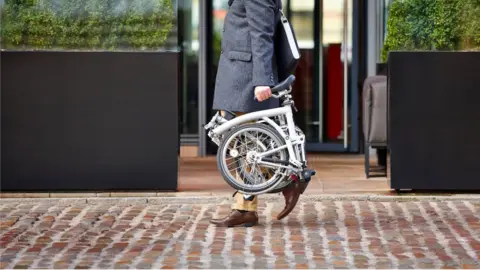 Getty Images
Getty ImagesEfforts to get more people cycling will start from a low base.
Men are much more likely than women to be cycling commuters, at 4% versus 1%.
There are also regional variations; in some more rural council areas like Newry, Mourne and Down the survey data suggested there are no cycling commuters at all.
The figures are higher in the urban areas around Belfast, with Mid and East Antrim hitting 6%.
David Wright is an experienced and confident cyclist who, in normal times, makes his daily commute from Lisburn to Belfast by bike.
He is clear what will be needed to get more people to follow in his tracks: safe infrastructure.
"Properly segregated from cars, none of this paint-a-white-line nonsense," he said.
"We seem to have all these little pockets of bike infrastructure which then just stop and don't join up."
He also points to the phasing of traffic lights which always favour cars.
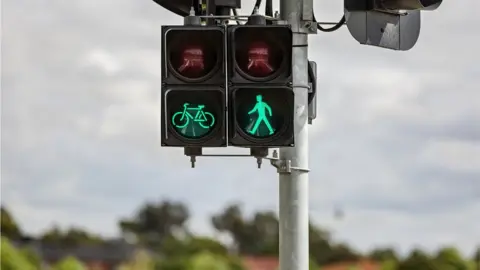 Getty Images
Getty ImagesMr Wright has noticed what appears to be more new or inexperienced cyclists on the roads during the the lockdown: "They need to be encouraged with safe, properly joined-up segregated infrastructure."
That need to encourage new cyclists is echoed by Stephen Martin, the interim Northern Ireland director of Sustrans, a charity which promotes cycling and walking.
He said what the minister is proposing is meeting an immediate, practical need.
"With walking, for example, it's just going to allow more space to meet the regulations and for those who want to cycle, it gives them a bit more safety.
"Now is the time to trial these things on a temporary, pop-up basis; if people like what they see there's a chance it might become permanent."
Mr Martin is urging bold moves such as closing some street to cars.
"In short, if you've got a narrow road, you may close it."
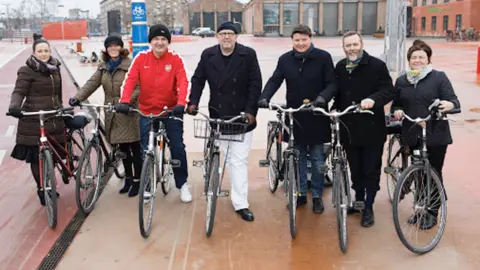 Cycling Embassy of Denmark
Cycling Embassy of DenmarkHe cites the example of Hill Street in Belfast's Cathedral Quarter, a cobbled lane with narrow footpaths.
If there is to be a longer-term investment in cycling infrastructure the question arises of how to pay for it.
Mrs Mallon told the assembly her department is facing spending pressures of £181m this year as a result of this crisis.
This largely reflects the collapse in fare revenue at Translink, the publicly-owned transport company.
However, these pressures primarily relate to the revenue (day-to-day spending) part of the budget rather than capital (investment) spending.
Mr Kennedy suggests it may be time to reassess how that capital budget is used.
"Are we at this stage going to continue to with big, grandiose road schemes?"
